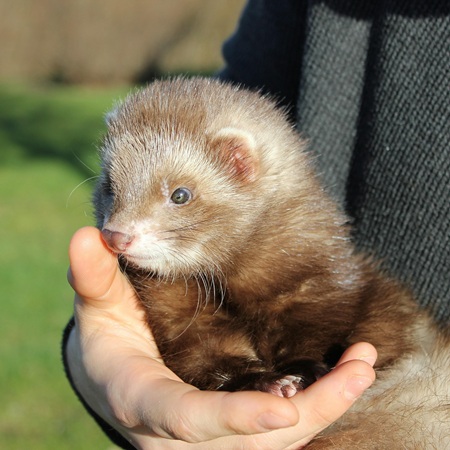
Providing proper care for a ferret helps reduce odors and keeps them healthier.
Diet
Ferrets are obligate carnivores – meat eaters. They need a diet that is high in meat protein and high in fat. Look for kibble that has at least 35% protein and 20% fat. Do not feed your ferret cereals, grains, sugars, fruits, or vegetables. They cannot digest these foods and fruits, or vegetables can cause a bowel obstruction. Most kibble does contain small amounts of carbohydrates as a binding agent, or you’d end up with a bag of powder. The key is to read the contents carefully. Ingredients are listed in the order of highest percentage of content to least percentage of content. The first item listed should be a meat or poultry. Fish and fishmeal are okay but may give the food and resulting stool a strong smell. High protein diets require more water to be processed by an animal’s body than lower protein diets. Clean, fresh water should always be available.
Reducing Odors
Ferrets have one of the strongest body odors of any animal kept as a house pet. Many people try instinctively to wash the smell away by bathing. This is a problem with ferrets because giving them too many baths make the smell worse. A ferret has musk glands in its skin and the majority are concentrated around the face and nose. Hormonal activity is one of the leading causes of ferret odor. Hormones stimulate the production of the musk from the glands in the ferret’s skin. Having your ferret spayed or neutered will drastically reduce the smell associated with musk production from hormonal activity. A ferret will produce this musk if its skin gets dry and itchy. The ferret’s skin is naturally oily and when you strip its skin of the oil it will produce its own musk to re-oil the skin and coat.
Most people tend to bathe their ferrets every two or three months while some just bathe them twice a year (at coat changes) and any time they get dirty from being mischievous. Such as digging up your special flower or playing in the ashes of a fireplace. Remember when you do bathe a ferret you must use a gentle shampoo. One designed for ferrets is optimal, but kitten shampoos are will also work. Never use harsh detergents such as dish washing liquids.
Another cause of smell in ferrets that is commonly overlooked is their ears. Earwax buildup in a ferret can be smelly. Therefore a ferret’s ears should be checked and cleaned every few weeks. If the wax is smelly and black it is an indication of ear mites and should be treated. Bad breath is also common for a ferret, and this could indicate dental problems. Ferret teeth should be brushed often with a special pet toothbrush and paste. This will help to prevent tartar buildup. Tartar buildup can be smelly and if left alone it can lead to gum disease or even kidney infections.
Never spray colognes or dust your ferret with powders, as doing this can cause respiratory problems for your ferret. Avoid alcohol-based products and look for those that neutralize odors rather than hide the odor. There are products on the market that are manufactured for use on ferrets. These are the ones to use by choice.
Provided by Creatures Corner reader Stanley Roberts
Related Articles & Free Email Newsletter Sign Up
3 Great Fish for a First Time Aquarium Owner
How to Eliminate Bad Behavior in Pet Rabbits


Comment here